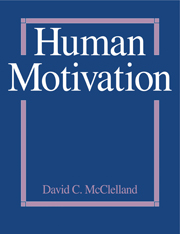Book contents
- Frontmatter
- Preface
- Foreword
- Contents
- Part 1 Background
- Part 2 The Nature of Human Motives
- Part 3 Important Motive Systems
- Part 4 Contextual Effects on Human Motives
- 11 Motivational Trends in Society
- 12 Cognitive Effects on Motivation
- 13 How Motives Interact with Values and Skills to Determine What People Do
- 14 Motivation Training
- 15 Milestones in the Progress Toward a Scientific Understanding of Human Motivation
- Bibliography
- Acknowledgments
- Index
15 - Milestones in the Progress Toward a Scientific Understanding of Human Motivation
Published online by Cambridge University Press: 05 July 2014
- Frontmatter
- Preface
- Foreword
- Contents
- Part 1 Background
- Part 2 The Nature of Human Motives
- Part 3 Important Motive Systems
- Part 4 Contextual Effects on Human Motives
- 11 Motivational Trends in Society
- 12 Cognitive Effects on Motivation
- 13 How Motives Interact with Values and Skills to Determine What People Do
- 14 Motivation Training
- 15 Milestones in the Progress Toward a Scientific Understanding of Human Motivation
- Bibliography
- Acknowledgments
- Index
Summary
Motivation has always fascinated people and will continue to fascinate them so long as there are people around to wonder why human beings and animals behave as they do. Nearly everyone develops an explicit or implicit theory of motivation. We think we know why our parents are sometimes disagreeable and try to continue to control what we do: they want the pleasure of continuing to dominate us. Or we think we know why our girlfriend or boyfriend has abandoned us: he or she prefers to be with someone with greater prestige or more possessions than we have. Or we think we know why we cannot seem to study very hard: we have a low need to achieve. Authors, philosophers, economists, politicians, and the people next door have all operated in terms of theories of motivation. Shakespeare vividly portrayed the lust for power in MacBeth and the longings of love in his Sonnets. Plato explored the nature of love in the Symposium. Economists think in terms of the desire to acquire possessions, and they write of the importance of the profit motive. Political observers from Machiavelli to the present have stressed the importance of the desire for power in human affairs.
- Type
- Chapter
- Information
- Human Motivation , pp. 587 - 608Publisher: Cambridge University PressPrint publication year: 1988



